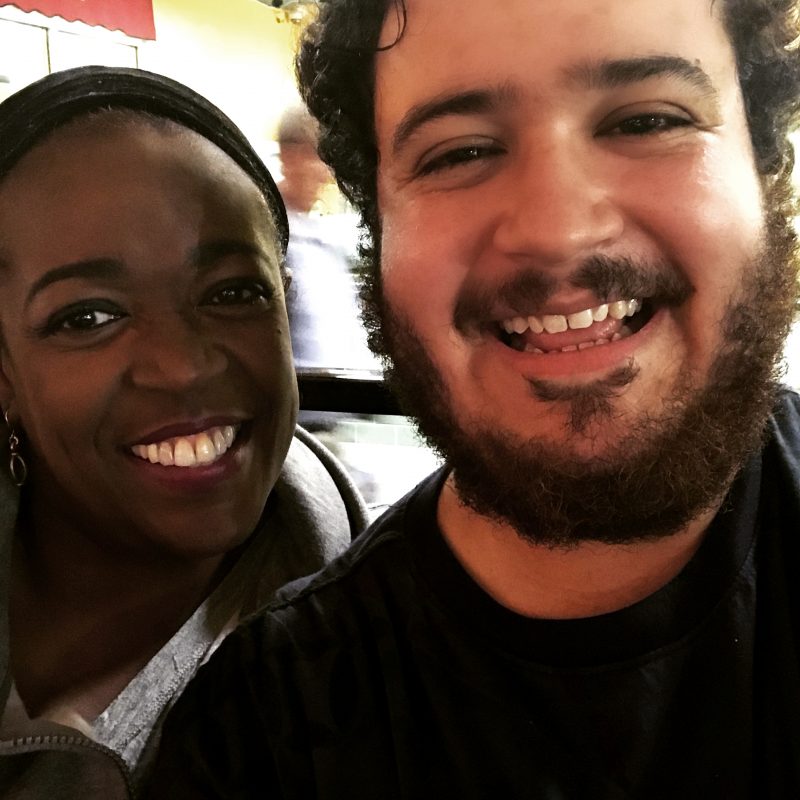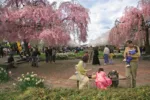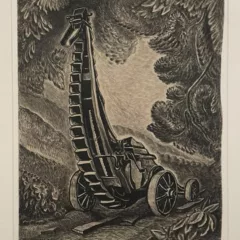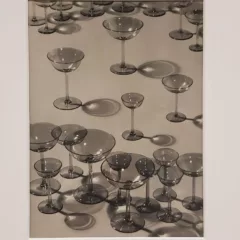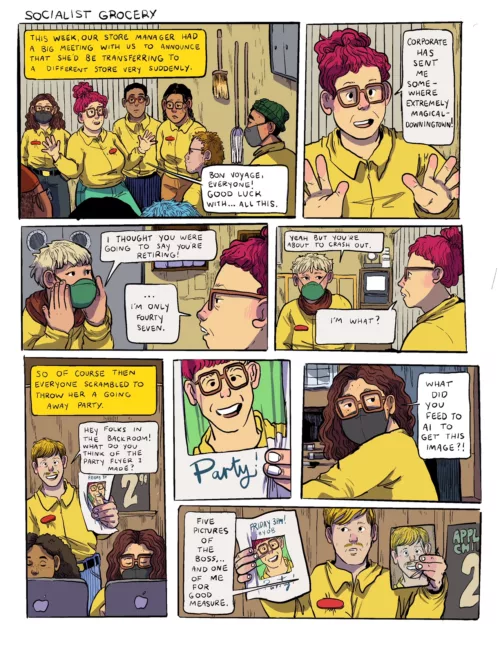A few weeks ago I met up with Mona R. Washington, a local playwright and Harvard-educated lawyer. What we didn’t talk too much about was her new play, “Lacunae,” which is being featured at Philadelphia Assembled. But we did have a very long discourse about artists of color and white supremacy in the arts.
In the spirit of collaboration, we decided to write a play about the conversation we had. Yes, cider was involved, but no, it was not involved in the writing of this piece. At least, as far as I know – this started as a Google Doc that we edited remotely so anything could’ve been happening from my side of the screen.
“CIDER”
Setting: November 2017, weekday afternoon. Reading Terminal Market, Philadelphia, PA
Characters: A and B
A and B sit at the bar at the Pub, a glass of cider in front of each. Not much light, but there’s a constant conversational low buzz from the other patrons.
A: Have you seen the “Barrymores so white” hashtag?
B: Yeah. It’s not enough.
A: Well, with a hashtag that specific, what do you expect?
B: See, here’s my two cents: I don’t know why they can’t just be honest. When they say “Best Actor”, why can’t they just say what they really mean? “Best White Actor”!
A: Then people of color won’t be led to believe they’re capable of succeeding within these institutions.
B: Exactly!
A: And then melanated people can focus on getting some money and supporting themselves.
B: Right. We’re far too valuable to our own communities to be supporting white ones at our own expense.
They toast and clink their glasses.
A: I hear that!
B: The ceremony wasn’t surprising to me at all. It just affirmed what I already knew about the Philly theatre community.
A: Don’t bother with them.
B: No worries, I’ve already moved on.
A: Good for you!
They toast and clink their glasses.
B: But I’ve gone on and on about myself…tell me about this play you’re writing! It’s called… ‘Lacuenay’?
A: ‘Lacunae’, [luh-kyoo-nee]—unfilled spaces or intervals, gaps. When something is missing that arguably should be there… like a chapter in a book.
B: ‘Lacunae’….
A: It’s the only word and concept I could think of that encapsulates the artistic process. We need some flexibility, some give. Some gaps even. But how much is too much. When does the work feel done? You know, when you’re creating something and you almost–
B: You almost finish it. But you’re not sure.
A: Right. Do I leave it alone? Or risk sacrificing subtlety for clarity?
B: You don’t know where to end it. I’ve been there.
They toast and clink their glasses.
A: That’s what I feel like whenever I’m writing something. At what point is the writing good enough, knowing that there’s good space and bad space and that it’s not necessary to nail down every bit—or even know what is happening. Or, am I being obtuse?
B: All that in one word? ‘Lacunae”.
A: Well—
B: I hate it when I’m too vague because I’m not trying hard enough to convey nuance-
They toast and clink their glasses.
A: So your play is about gaps and holes?
B: At least. My play is about the give and the holes and flexibility in making art. Space isn’t inherently good or bad. It’s what we do with it.
A: Interesting. So you think there were lacunae with the “Barrymore’s so white situation”?
B: At least, and then some. I think there can be many lacunae, that something can break. The Barrymores are broken. But…
A: But what?
B: Maybe I should be rightfully upset about the Barrymores, but still try to break into the mainstream. Both/and, instead of either/or.
A: Interesting.
B: Desperate?
A: Nah, I don’t think you’re desperate. When you’re used to seeing white face after white face succeed and be elevated, it’s natural to want to be on the same level as them. But somewhere down the line you realize that their success, to some extent, is manufactured-
They toast and clink their glasses.
A: And that no matter how hard we try to be on their level, only a handful of us are going to reach that plateau, because at a certain point the black best friend of the artistic director is going to be the one who gets the gig or the part or the opportunity-
They toast and clink their glasses.
A: And then you realize that the only way you can slay this insurmountable hydra of white supremacy, fake inclusion and artistic nepotism-
They toast and clink their glasses.
A: Is by dropping the sword and walking away from it entirely. By creating your own force-
They toast and clink their glasses.
A: Equal to theirs, but not attempting to compete with them in any way because…hm…because-
B: Because then there would be no space for our own development.
They toast and clink their glasses.
B: Our own culture.
They toast and clink their glasses.
B: Our own spaces.
They toast and clink their glasses.
B: Because all this time we’ve spent fighting against whiteness…
A: …Has given us very little opportunity to explore what makes us Us!
They toast and clink their glasses repeatedly. They do this for a while, almost creating a rhythm. The glasses break. Lights dim. With the broken pieces, they construct a new shape. A new form. A new structure.
END OF PLAY.
If you’re interested in learning more about Mona’s beautifully introspective and political work, check out “Lacunae,” which will be performed at the Perelman Building, Dec. 9th, at 12 PM. You can also check out excerpts of her work in the Philadelphia Assembled Reconstructions blog. Mark it on your calendar, bring a flask filled with cider, and a friend as well!
